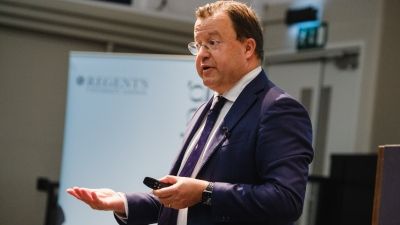Overview
Explore the technologies, trends and audiences shaping global marketing.
Discover global marketing tools and techniques, and learn how to meet varied consumer demands through creative and flexible approaches. You'll grow into a media-savvy marketer with the confidence to respond to rapid market changes, develop strategies, build campaigns and convert customer targets.
Why Regent’s?
- An intimate campus: located in the heart of London’s royal Regent’s Park
- Unparalleled global connections: gain exposure to leading industry professionals
- Future-facing: an innovative curriculum structure that's unique to Regent's
- Small class sizes: experience tailored attention, support and guidance
- Practical learning: work on live projects and briefs with industry leaders
- Future-focused: develop innovative new marketing strategies and techniques
- Digitally informed: access real customer insights through data analytics
- Interdisciplinary: acquire knowledge from other disciplines – fashion to psychology
Discover more!
What to expect
You'll explore marketing in its entirety (traditional, contemporary, digital, social, retail and marcomms) but focus on contemporary theories and approaches – learning how and why we target consumers, examining how they feel and act, predicting their next actions, and developing data-driven campaigns that tell a story, influence and turn targets into leads.
Drawing on real case studies from around the world, you’ll learn which approaches work for different cultures, explore how emerging technologies can assist with relationship management and examine the extent to which big data will replace traditional market research and marcomms in the future – taking values, ethics and sustainability into consideration.
Working on live projects commissioned by industry leaders, you'll learn how marketing fits into the wider business landscape (touching on data, strategy, law, finance, research), discover new marketing trends and pick up tips and tactics to use yourself – from building strategies to writing captivating proposals.
In your final term, you’ll complete a dissertation or major project, exploring something that interests you, such as the integration of AI or the influence of TikTok on consumer behaviour. You’ll graduate as a strategic and creative thinker, with a deep understanding of the relationship between company and consumer.
London-centric learning
With London on your doorstep, you’ll have opportunities to engage with all aspects of the marketing arena – gaining practical experiences and building valuable relationships.
- Learn from industry experts – e.g., brand guru (and creator of Baileys) David Gluckman
- Build connections at the Digital Transformation Expo at ExCeL London
- Visit London’s media hubs and museums – e.g., The Museum of Brands, Design Museum
- Join guest speakers on campus: Meta, Google, Burberry, Harrods
A tailored experience
We put you in the driving seat – shaping your education from day one:
- Your own support officer: receive tailored advice and support when needed
- Academic guidance: access regular one-to-one sessions and a unique open door policy
- Flexible modules: personalise your course with a choice of special electives
- Additional language classes: prepare for domestic and international opportunities
Award for excellence
In honour of Regent’s colleague and President of the Chartered Institute of Linguists, Dr Nicholas Bowen, we offer one lucky student £2,000 towards this course. Learn more.
Optional Foundation year
If you opt for a Foundation year, you'll gain a solid grounding in academic skills and principles, as well as an introduction to your chosen subject area. It will provide a rich and varied experience to ensure you’re prepared for degree-level study in the UK – ready to develop specialist knowledge and confidently make the most of your course.
Download course specification.











